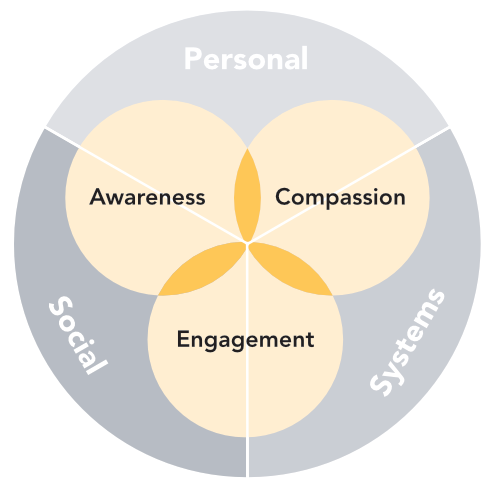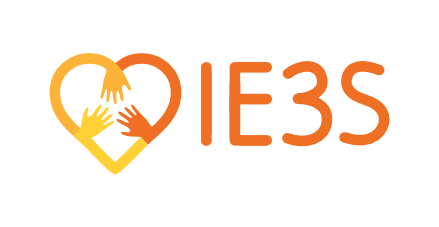Social, Emotional, and Ethical Learning
Social, Emotional, and Ethical Learning:
It is an international project led by Emory University, under continuous evaluation and improvement, that allows the use and development of tools in different contexts and cultures depending on your needs.
It is grounded in the idea that education can, and indeed should be expanded to foster the development of basic human qualities and social skills.
It provides educators with a global pedagogical framework for the cultivation of social, emotional and ethical skills, as well as easy to implement educational experiences.
It employs four main pedagogical components: critical thinking, reflective practices, scientific perspectives and active pedagogies, and mainly covers the field of education from 3 to 18 years.
The educational sessions or activities are short, and the pedagogical proposals of the program have been designed so that their implementation does not imply an excessive training or a teaching time overload for the educator, and they are adaptable to the circumstances of each school and classroom.
Three Domains and Three Dimensions
The SEE Learning has three domains:
Personal
It focuses on personal care.
Social
It expands the focus towards an awareness of others and the development of effective interpersonal skills in the relationship with other people.
Systems
It is oriented to the development of consciousness, values and skills focused on wider communities and the world in general so that they can become citizens of the world who can make effective and responsible decisions.

Each domain is related to three dimensions:
Awareness
Acquire greater attention and awareness of thoughts, emotions and feelings; greater awareness of others and their inner world, and greater awareness of interdependence and how it relates to their lives and the systems in which they live.
Compassion*
Cultivate emotional well-being and personal care skills; empathy and compassion committed to others, and a recognition of shared humanity that allows giving value to any human being wherever he or she is.
*See what is meant here by "compassion"
Compassion is the ability to relate to oneself and to others with consideration for one’s or other’s well-being and discomfort. It is the ability to perceive and recognize suffering and the genuine desire to relieve it. It is an essential human quality both for the person and for a healthy relationship with their environment. Scientific studies indicate that compassion thus understood increases positive moods, resilience, the ability to cope with stressful situations and prosocial attitudes1. Likewise, programs are being studied to improve compassion in young people as a means of prevention and overcoming bullying, aggressiveness and violence2,3.
1 Singer et al., Empathy and compassion, Curr Biol. (2014).
2 Vigna et al., Does self-compassion facilitate resilience to stigma? A school-based study of sexual and gender minority youth, Mindfulness (2017).
3 C. Bergland, Mindfulness Training and the Compassionate Brain, Psychology Today (2012).
Engagement
Develop increasingly rich self-regulation skills, an attitude that distinguishes between what is beneficial at the individual level and for others, from what is not; the ability to interact with others in a constructive and considerate manner and the ability to act effectively and with confidence in the community and globally thinking of a broad social good.
Skills promoted in students
In the personal domain:
- Attention and Self-Awareness: Attending to our body, sensations, emotions, and feelings. Mapping emotions.
- Self-Compassion: Understanding of emotions and developing self-acceptance.
- Self-Regulation: Balancing the body; cognitive and impulse control; and navigating emotions.
In the social domain:
- Interpersonal Awareness: Attending our social reality, and our shared reality with others. Appreciating diversity and difference.
- Compassion for Others: Understanding other’s feelings and emotions in context. Appreciating and cultivating kindness and compassion, and other ethical dispositions.
- Relationship Skills: Empathic listening, skilful communication, helping others, and conflict transformation.
In the systems domain:
- Appreciating Interdependence: Understanding interdependent systems, and individuals within a systems’ context.
- Recognizing Common Humanity: Appreciating the fundamental equality of all and appreciating how systems affect well-being.
- Community and Global Engagement: Exploring one’s potential for effecting positive change in community and world. Engaging in communal and global solutions.
Features of the Program
1
A focus on the cultivation of compassion and other basic human values and “ethical intelligence”
2
Methods for attention training
3
Inclusion of “systems thinking”
4
A resilience- and trauma-informed approach
5
Constructivist, student-focused pedagogy
Schools and Educators
 |
Eulàlia Guiu Puget, PhD General Coordinator eulalia.guiu@udg.edu |
 |
Eulàlia Guiu Puget, PhD Associate Professor |
 |
Amapola Povedano Díaz, PhD Associate Professor |
